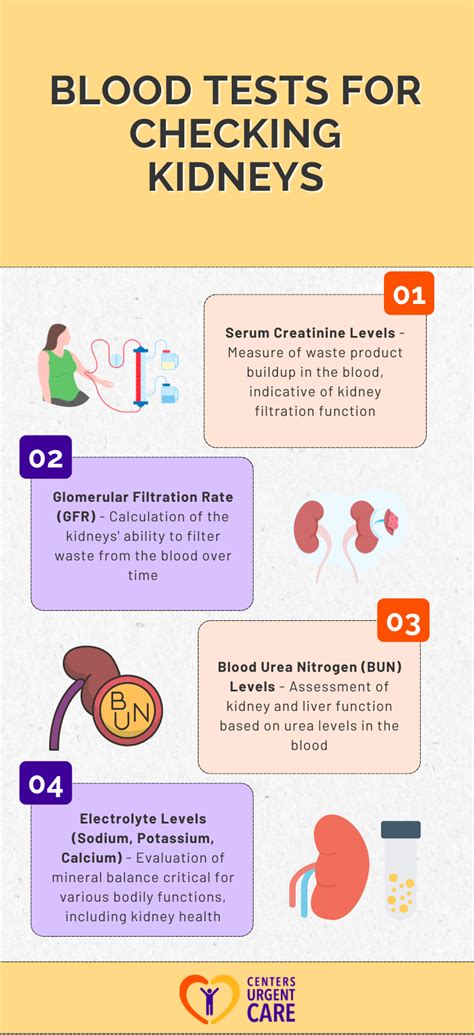10 Kidney Blood Work Tests For Accurate Results

Understanding the intricacies of kidney function is paramount for diagnosing and managing a variety of health conditions. Kidney blood work tests are crucial tools in this endeavor, offering healthcare providers valuable insights into how well the kidneys are performing their roles. These tests can detect issues ranging from mild impairments to severe kidney diseases, guiding treatment decisions and management strategies. Here, we’ll delve into 10 key kidney blood work tests that are essential for obtaining accurate results and ensuring comprehensive care.
1. Serum Creatinine Test
The serum creatinine test is a fundamental assessment of kidney function. Creatinine is a waste product from the normal breakdown of muscle tissue, and healthy kidneys are responsible for filtering it out of the blood. If the kidneys are not functioning properly, creatinine levels in the blood will rise. This test is used to estimate the glomerular filtration rate (GFR), which is a key indicator of kidney function.
2. Blood Urea Nitrogen (BUN) Test
The BUN test measures the amount of urea nitrogen in the blood. Urea is another waste product that the kidneys should filter out. Higher levels of BUN can indicate that the kidneys are not removing waste effectively. However, BUN levels can also be influenced by factors unrelated to kidney function, such as dehydration or a high-protein diet, so it’s often used in conjunction with other tests.
3. Glomerular Filtration Rate (GFR) Test
The GFR test provides a more direct measure of kidney function by estimating the volume of filtered fluid through the glomeruli (capillaries in the kidneys) into Bowman’s space per unit of time. A lower GFR indicates impaired kidney function. The GFR can be estimated using the results from the serum creatinine test, along with factors such as age, gender, and body size.
4. Cystatin C Test
Cystatin C is a protein produced by all cells that is eliminated by the kidneys. Measuring cystatin C levels in the blood can provide an estimate of kidney function that is less influenced by muscle mass compared to serum creatinine. This makes it particularly useful in certain populations, such as the elderly or those with muscle wasting diseases.
5. Uric Acid Test
While not exclusively a marker of kidney function, uric acid levels can provide insight into the kidneys’ efficiency in removing waste products. High levels of uric acid can indicate decreased kidney function, among other conditions. This test is often used in conjunction with others to assess kidney health.
6. Phosphorus Test
Phosphorus levels in the blood are regulated by the kidneys. In kidney disease, phosphorus can accumulate, leading to a range of complications. Monitoring phosphorus levels is essential in managing kidney disease, especially in advanced stages.
7. Calcium Test
Calcium levels are closely linked with phosphorus and kidney function. The kidneys help regulate calcium levels by activating vitamin D, which enhances calcium absorption in the intestines. Abnormal calcium levels can indicate kidney problems, among other conditions.
8. Electrolyte Panel
An electrolyte panel measures the levels of various electrolytes (such as sodium, potassium, chloride, and bicarbonate) in the blood. The kidneys play a crucial role in maintaining the balance of these substances, which are vital for many bodily functions. Imbalances can signal kidney dysfunction.
9. Parathyroid Hormone (PTH) Test
PTH is a hormone produced by the parathyroid glands that helps regulate calcium levels in the blood by affecting bone resorption and calcium absorption in the gut. In chronic kidney disease, the kidneys may not be able to activate vitamin D effectively, leading to increased PTH levels as the body tries to compensate for low calcium levels.
10. Albumin Test
Albumin is a protein made by the liver and is a key component of blood. Low levels of albumin in the blood (hypoalbuminemia) can indicate that the kidneys are allowing protein to leak into the urine, a condition known as proteinuria. This can be a sign of kidney damage or disease.
In conclusion, these 10 kidney blood work tests serve as vital tools in the assessment and management of kidney health. Each test provides unique insights into different aspects of kidney function, allowing for a thorough understanding of how well the kidneys are performing. By leveraging these tests, healthcare providers can offer targeted interventions and improve patient outcomes for those affected by kidney disease.
What is the primary use of the serum creatinine test in assessing kidney health?
+The primary use of the serum creatinine test is to estimate the glomerular filtration rate (GFR), which is a key indicator of kidney function. It helps in assessing how well the kidneys are filtering waste from the blood.
<div class="faq-item">
<div class="faq-question">
<h3>Why is the GFR test considered a more direct measure of kidney function compared to other tests?</h3>
<span class="faq-toggle">+</span>
</div>
<div class="faq-answer">
<p>The GFR test is considered a more direct measure because it estimates the volume of filtered fluid through the glomeruli into Bowman's space per unit of time, providing a clear indication of the kidneys' filtering efficiency.</p>
</div>
</div>
<div class="faq-item">
<div class="faq-question">
<h3>Can kidney blood work tests detect kidney disease in its early stages?</h3>
<span class="faq-toggle">+</span>
</div>
<div class="faq-answer">
<p"Yes, kidney blood work tests, especially when combined, can detect signs of kidney dysfunction and disease in their early stages, allowing for timely intervention and potentially slowing disease progression.</p>
</div>
</div>
</div>
As the field of nephrology continues to evolve, the role of these blood work tests in managing kidney health will remain crucial. By understanding the insights these tests provide, patients and healthcare providers can work together to prevent, diagnose, and treat kidney diseases more effectively.



